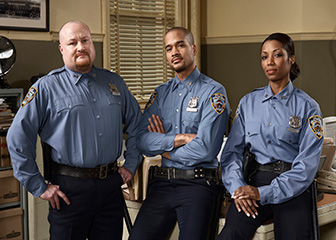Finding a Qualified Resume Writer for a...
|
| Resume Writers... | Thumbnail Review... |
|
www.resumewriters.com | Reasonable pricing, standout writing, and an interview guarantee from the largest network of resume writers on the Internet (representing more than 5 dozen career fields and industries). Guaranteed interviews within 60 days. The BBB gives them an A+ rating. |
|
|
www.greatresumesfast.com | Pricey, yes. But writing is "top shelf" from a team of HR Execs, Hiring Managers and former Recruiters, each detailed on the company's website. Expect an hour-long consultative phone session with your writer. Guaranteed interviews. The BBB gives them an A+. |
Considering a Career Move into Police Work?
If you're considering a move into police work from either a closely related field or from a totally unrelated profession, you'll be looking for a transitional resume -- and a talented resume writer to handle the assignment. Transitional resumes are some of the most difficult resume projects as they require a writer knowledgeable in at least two professions -- and the ability to identify transferable skills from one to the other.
Before you hand off that resume assignment, make sure you know enough about the job of a Police Officer or Patrol Officer to... a) really want it, and b) be able to step up to the plate. Here's a quick overview (more information at Wikipedia - Police Officer):
 |
What You'll Do: Police officers have a wide range of duties depending on their specialization. Uniformed officers generally patrol assigned districts and respond to emergencies. Detectives look for evidence and conduct interviews to solve crimes. Wardens work in the outdoors and enforce hunting laws, fishing laws and more. These police officers and other types of officers have the following general duties: report writing, patrolling, interviewing, responding to calls, issuing citations, making arrests, and testifying in court. You will probably be assigned to a specific district within the US where you will carry out your duties. Most police work is done in a police station or on the road, and you may work long and unusual hours to close a case, finish paperwork, or when you are called into action while on call. |
 |
Education and Training: A high school diploma is the minimum requirement for most police jobs, but most employers prefer or require a college degree. A police academy program must also be completed before hire. This intense training period introduces prospective officers into the world of law enforcement and molds them into the brave men and women they must be on the streets. You will learn and be tested in the areas of: law, ethics, driving ability, firearms proficiency, self-defense, first aid, traffic control, interviewing techniques, emergency response and more. After passing police academy, you may become a sworn officer if you are at least 21 years old. For the first few years, patrol duties are usually mandatory. If you perform those duties well, you will get a chance to specialize and become a detective or S.W.A.T. officer, for example. If you are good at your job, there should be no shortage of promotional opportunities. |
 |
The Future: The Police Officer profession is expected to grow at about 7% through 2020. |
 |
The Pay: Annual salaries for Police Officers in the U.S. range from $32,400 to $88,800, with the average median annual wage hitting $55,200 in 2012 as per the U.S. Bureau of Labor Statistics. |
Still interested in pursuing a position in police work? Got the qualifications? Great. The next step is to prepare for a consultative telephone interview with your resume writer. Treat the coming job search like the business it is, and you'll do fine.
Best of luck,
David Alan Carter, OccupationalResumes.com

Tag or bookmark under:
Police Officer Resume | Police Occupation | Resume Writing Services for Police or Patrol Officers
_____
NOTE: This website
is monetized through the use of Affiliate Programs with the online providers we review. Read our Disclosure Statement for more information on our Affiliate
Relationships.
|



 Back To
Top
Back To
Top Facebook
Facebook Twitter
Twitter